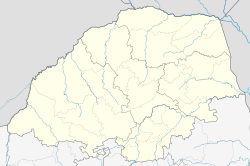Namakgale
| Namakgale | |
|---|---|
|
|
|
| Coordinates: 23°56′17″S 31°01′41″E / 23.938°S 31.028°ECoordinates: 23°56′17″S 31°01′41″E / 23.938°S 31.028°E | |
| Country | South Africa |
| Province | Limpopo |
| District | Mopani |
| Municipality | Ba-Phalaborwa |
| Established | 1959 |
| • Councillor | (African National Congress) |
| Area | |
| • Total | 12.97 km2 (5.01 sq mi) |
| Population (2011) | |
| • Total | 36,365 |
| • Density | 2,800/km2 (7,300/sq mi) |
| Racial makeup (2011) | |
| • Black African | 99.6% |
| • Coloured | 0.1% |
| • Indian/Asian | 0.1% |
| • White | 0.1% |
| • Other | 0.1% |
| First languages (2011) | |
| • Northern Sotho | 65.5% |
| • Tsonga | 23.3% |
| • Sotho | 3.8% |
| • Zulu | 2.0% |
| • Other | 5.3% |
| Postal code (street) | 1391 |
| PO box | 1391 |
| Area code | 015 |
Namakgale is a large township lying 12 km outside Phalaborwa in Mopani District in the Limpopo province of South Africa. Its nearest neighbouring townships are Lulekani, Makhushane, Maseke and Mashishimale on the R71 road to Gravelotte. It is next to the Kruger National Park on the north eastern part of the Limpopo province previously Northern Transvaal. The township enjoys the annual Marula festival during the months of February and March, when the ripe Marula fruit harvest is at its peak, and the Marula traditional beer is brewed. This is home to the Amarula liqueur is harvested, and the pulp is shipped to Cape Town for further processing. The citizens of Namakgale will enjoy the Mopani worms first harvest during March and April, and the second harvest in December. the Mopani tree and the Morula tree are very important to the residents of the Namakgale as they bring important community subsistence farming.
Namakgale is largely inhabited by migrant labourers and their descendants. Most of this migrant labourers originate from the Bolobedu area, Tzaneen, Ga-Sekororo and Bushbuckridge. Most of the people in Namakgale are employed in mining, namely Palabora Mining Company (PMC), Sasol Agri and FOSKOR.
The majority of the residence of Namakgale speak Northern Sotho language, with the Sepulana, KhePhalaborwa and KheLobedu dialects being the most predominantly spoken forms. The N'walungu variety of Xitsonga is the second most spoken language after Northern Sotho.
The Residents of the neighbouring villages of Ga-Makhushane, Ga-Mashishimale, Ga-Maseke and Ga-Selwane are proudly called Ba-Phalaborwa ba ga Malatji, a North Sotho tribe of Kalanga extraction. The Malatji Royal Family venerates the Totem of the Noko, a Porcupine and the clan is generally called Dinoko as a symbol of respect.
...
Wikipedia



